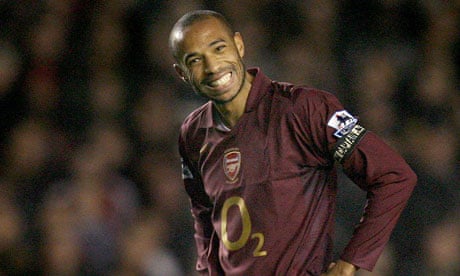Thierry Henry can not only show his medals to the Arsenal dressing room, he can show his statue. The striker welled up at the unveiling of his bronze likeness at Emirates Stadium this month and it seemed unkind to wonder whether he had been commemorated before his time. But the feeling will gather strength if and when the 34-year-old completes a startling return to the club, and pulls on the red-and-white jersey in the new year. Reports on Thursday night suggested it will happen in the next two days.
It is doubtful that Arsène Wenger had considered re-signing Henry on a short-term loan from the New York Red Bulls when the sculptors received their commission as part of Arsenal's 125-year anniversary celebrations. The manager, incidentally, came over all self-conscious when a bust of himself was sited at the players' entrance to the stadium. "I thought I was dead when I saw it," he said. Yet the curious prospect of the return of a legend who is not only alive but still kicking beckons.
It feels risky. When Henry left Arsenal for Barcelona in 2007, after eight glorious seasons in north London, the joke was that he needed an additional business-class seat for his ego. He had almost transcended the club with his personality and status, and his departure was considered by some as necessary for the younger players to blossom. Henry had become such a focal point that his team-mates would feel compelled to seek the pass to him even when it was not on.
One story from his final season sticks in the memory. Arsenal had lost at Fulham at the end of November and Wenger had substituted Alex Song at half-time after the midfielder had endured a dreadful game. In front of the rest of the squad Henry castigated Song, which deeply upset Wenger. Henry was suffering from sciatica and Wenger told him that he was taking him out of the firing line, starting in the next game – the derby against Tottenham Hotspur. Henry left the training ground in a rage. Due to injury problems, he played only a further 10 times for the team.
Song, of course, remains at the club, together with a clutch of others who worked with Henry in the first-team squad – Manuel Almunia, Johan Djourou, Tomas Rosicky, Abou Diaby, Theo Walcott and Robin van Persie. What impact Henry would have on the chemistry of the match-day dressing room is the greatest intangible, particularly as he would most likely be a mere squad member, fighting with Park Chu-young for the right to understudy Van Persie.
The notion of Henry as a cheerleader on the bench does not sit easily with the memories of him in his va-va-voom pomp, when he was arguably the finest player in the country, an explosive package of pace, skill and ruthlessness who celebrated by sliding on his knees after putting opponents on theirs. Henry scored 15 times in 29 games for the Red Bulls last season but he is obviously no longer the same player. Nobody, least of all himself, would want him to sully his Arsenal legacy.
A section of the club's dressing room would be caught in two minds were Henry to return on a permanent, longer-term contract. Privately, one or two of them wonder why Ian Wright was not selected for the statue and there is the media circus that may accompany Henry. But the prospect of a quick fix appears to suit, with the positives vying for prominence. Wenger needs temporary cover for Marouane Chamakh and Gervinho, who are bound for the Africa Cup of Nations, and Henry may also offer an emotional lift.
He has been training hard and impressively with the squad during the MLS close-season and, as importantly, he has clicked with the key characters. Henry is a different person to the one who left Arsenal, having become less egocentric, possibly as a result of him not being the main man at Barcelona. In New York he has faded from the European consciousness.
Wenger's Arsenal squad is also different. Players such as Song and Van Persie have matured into leaders, there are international captains aplenty and the transfer deadline day signings have brought further worldliness. It is not a dressing room to cower before Henry.
Wenger has gone back to the future in the second half of the past two campaigns, giving Sol Campbell a short-term deal in January 2010 and signing Jens Lehmann towards the end of last season. Wenger might remember how Campbell, despite some difficulties, played like the defensive titan of old in the derby at Tottenham and how Lehmann made vital saves in the victory at Blackpool. There is the recognition within the squad that increased fire-power is required and if Henry could make a couple of decisive contributions, then he would be feted once again.
Henry has been back to Arsenal since his departure. He appeared as a substitute for Barcelona in the Champions League in March of last year and this past summer he played for the Red Bulls against Arsenal in the Emirates Cup. There had been a plan for him to swap sides and play for his former team in the second half but, to his disgust, it was vetoed by the referee.
"They have some stupid rules," Henry said. "I'm sure the fans would have loved that and I would have loved that." His dream may yet come true.

